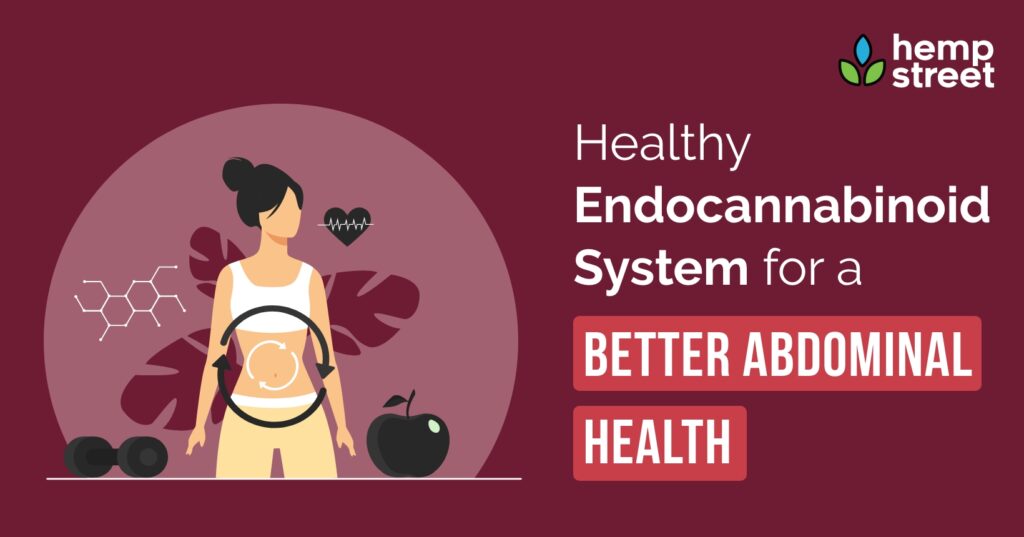A healthy abdomen is vital in our overall health and wellbeing. The abdomen contains all the digestive organs, and they are important for breaking down food and bringing nutrients to our bodies.
If gut health is not taken care of, the lack of proper nutrition can cause severe consequences on our health. It can also lead to numerous health conditions such as stomach pain, indigestion, bloating, constipation, and even irritable bowel syndrome.
Various factors influence abdominal health in our bodies, including different kinds of foods, eating habits, drug interactions, etc. But there is a major component of the body that exhibits a direct influence on our abdominal health, and that is the ECS!
Keep reading ahead to know what ECS is and how having a healthy ECS can significantly improve your abdominal health.
Role of ECS in Gut Health
The ECS or the endocannabinoid system is a vital biological system present throughout our bodies. It is responsible for regulating numerous crucial internal functions such as the nervous system, immune response, and digestive actions.
The ECS has a significant effect on the body’s gut health. First and foremost, it controls inflammation in the body. This is because inflammation is caused by immune cells and the ECS has a direct influence on the immune system. The endocannabinoids activate the cannabinoid receptors in the intestines, hence lowering the risk of damage to the gut.
Besides being in the digestive system, these cannabinoid receptors are also prominently present in the hypothalamus, which is a part of the brain that manages fundamental processes in the body.
As a result of this, when the ECS is stimulated, it controls the secretion of digestive juices in the system and its energy metabolism. Moreover, it maintains proper appetite signaling and digestive capability to encourage a healthy weight in the individuals.
The ECS modulates the movement of food through the bowel, thus preventing digestive conditions like constipation and diarrhea. It also plays a role in strengthening the intestinal barrier, which is responsible for taking up the nutrients from the food and preventing harmful bacteria and pathogens from entering.
Therefore, it prevents harmful diseases and inflammatory conditions such as irritable bowel syndrome, IBDs, obesity, etc.
The Gut-Brain Communication
The ECS moderates the two-way communication between the brain and the gut. When conditions like pain cause certain changes in the brain, they affect the gastrointestinal function in the body as well.
Similarly, when severe stomach pain, digestive diseases, and inflammatory conditions alter the gut, the ECS communicates this back to the brain. This happens because there exist numerous communication pathways that connect the gut to the brain.
One such pathway is the ‘vagus’ nerve, which is the longest nerve extending from the brain. It travels from the brain straight to the gut and transmits the messages between the two. The ECS in the gut uses such pathways to contact the ECS in the brain. This way, the gut and the brain work closely to maintain a healthy and balanced internal environment in the body.
Maintaining a Healthy ECS
Because of its direct influence on the gut, having a healthy ECS is crucial for better abdominal health. Medical professionals and healthcare experts prescribe numerous ways to help people strengthen their ECS. Some of them include:
- Consuming Omega-3 fatty acids helps boost the production of cannabinoid receptors in the body and facilitates better absorption of cannabinoids such as THC. Many seeds, legumes, seafood, dark greens, palm oil, and fish oil supplements are good sources of these acids.
- Reducing stress is crucial for a healthy ECS. As mentioned above, the ECS regulates gut-brain communication. And conditions like stress and anxiety harm the ECS by slowing down the growth, repair, and function of its endocannabinoid receptors. This can have a negative impact on your abdominal health.
- Consuming alcohol too can impede the receptors’ functioning and their ability to effectively process the cannabinoids. Hence, experts recommend decreasing its intake.
- Exercising is a great way to maintain a healthy weight, relieve stress, and improve ECS health. It also increases the production of the endocannabinoid called anandamide, also known as the bliss molecule.
The Role of Vijaya
Consuming Vijaya is found to be the best way to boost the ECS. Our bodies cannot always produce the necessary endocannabinoids in the required amounts. The cannabinoids in Vijaya help fulfill the cannabinoid needs of the ECS and restore its health.
The most common cannabinoids in this herb are CBD and THC. When people consume Vijaya, these cannabinoids bind with the ECS’s receptors and activate them. As a result of this, Vijaya gets a direct influence over the ECS and the body’s abdominal health. After the ECS gets activated, it better regulates the digestive processes in the body.
Among the cannabinoid receptors of the ECS, the most prominent are CB1 and CB2. CB1 is densely present in the central nervous system (CNS), i.e., the brain and the spinal cord. And the CB2 receptors have a high concentration in the immune system.
On one hand, by stimulating the CB1 receptors in the brain, Vijaya alleviates the conditions like stress, anxiety, depression, etc., that can negatively impact the gut. On the other hand, it stimulates the CB2 receptors in the immune system and modulates the production of inflammatory proteins produced by the immune cells. Thus, it reduces intestinal inflammation.
Because of the above actions, Vijaya not only enhances the ECS’s health but also significantly alleviates gut conditions like stomach pain, irritable bowel syndrome, diarrhea, constipation, and inflammatory bowel diseases.
To know more on how you can leverage the medical benefits of Vijaya and achieve a healthy ECS, contact Hempstreet.




